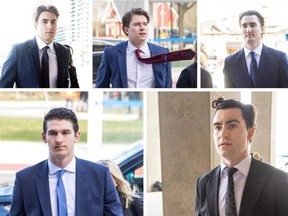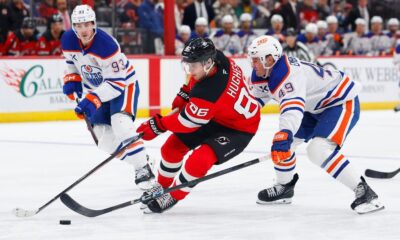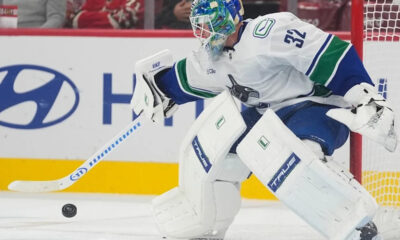Sports
NHL Holds Ineligible Status for Players After Court Acquittal

The National Hockey League (NHL) has announced that five players will remain ineligible to participate in league activities despite being acquitted of sexual assault charges. The decision follows a court ruling that did not find the players guilty, but the NHL emphasized that this does not absolve them of accountability for their behavior.
On March 7, 2024, the NHL stated, “The allegations made in this case, even if not determined to have been criminal, were very disturbing and the behaviour at issue was unacceptable.” The players—Carter Hart, Alex Formenton, Cal Foote, Michael McLeod, and Dillon Dube—continue to face scrutiny, with the league conducting a thorough review of the court’s findings to determine next steps.
The NHL’s standard player contract includes a clause requiring athletes to uphold “the highest standards of honesty, morality, fair play and sportsmanship.” This provision implies that while personal conduct may occur outside the public eye, any negative revelations can lead to disciplinary action from the league. The NHL Players’ Association (NHLPA) has challenged this stance, arguing that following a lengthy absence from the game, the players should have the opportunity to return to their professional careers.
The NHLPA stated, “After missing more than a full season of their respective NHL careers, they should now have the opportunity to return to work. The NHL’s declaration that the players are ‘ineligible’ to play pending its further analysis of the court’s findings is inconsistent with the discipline procedures set forth in the Collective Bargaining Agreement (CBA).” The organization aims to protect its members’ rights, but the ongoing situation highlights a broader issue regarding the NHL’s approach to misconduct.
The NHL remains the only major North American sports league without a clearly defined policy addressing domestic violence and sexual assault. This absence stands in contrast to the NFL, which has a structured policy guiding their actions in similar cases. For example, the NFL imposed an 11-game suspension on quarterback Deshaun Watson after he faced accusations from over two dozen women regarding sexual misconduct during massage therapy sessions. The NFL’s investigation was conducted under the framework of their established policy, providing clarity and consistency in handling such serious allegations.
In contrast, the NHL’s ad hoc approach raises questions about the expectations placed on players. The lack of a defined standard allows for arbitrary enforcement, which does not effectively communicate to players what is deemed acceptable conduct. This ambiguity contributes to a culture where the emphasis lies on avoiding detection rather than fostering accountability and personal growth.
As the NHL navigates this complex situation, the implications extend beyond individual players. There is a growing recognition that both the league and the NHLPA must embrace a leadership role in addressing the cultural issues surrounding misconduct in hockey. Establishing a clear and comprehensive policy would be a significant step towards promoting a safer and more respectful environment within the sport.
While the NHL’s recent actions are commendable in holding players accountable, the absence of a formal policy on domestic violence and sexual assault underscores the need for systemic change. Moving forward, the NHL must prioritize the establishment of clear guidelines that support a culture of respect and integrity, ensuring that all players understand the consequences of their actions both on and off the ice.
-

 World3 months ago
World3 months agoScientists Unearth Ancient Antarctic Ice to Unlock Climate Secrets
-

 Entertainment3 months ago
Entertainment3 months agoTrump and McCormick to Announce $70 Billion Energy Investments
-

 Lifestyle3 months ago
Lifestyle3 months agoTransLink Launches Food Truck Program to Boost Revenue in Vancouver
-

 Science3 months ago
Science3 months agoFour Astronauts Return to Earth After International Space Station Mission
-

 Technology2 months ago
Technology2 months agoApple Notes Enhances Functionality with Markdown Support in macOS 26
-

 Top Stories1 week ago
Top Stories1 week agoUrgent Update: Fatal Crash on Highway 99 Claims Life of Pitt Meadows Man
-

 Sports3 months ago
Sports3 months agoSearch Underway for Missing Hunter Amid Hokkaido Bear Emergency
-

 Politics2 months ago
Politics2 months agoUkrainian Tennis Star Elina Svitolina Faces Death Threats Online
-

 Technology3 months ago
Technology3 months agoFrosthaven Launches Early Access on July 31, 2025
-

 Politics3 months ago
Politics3 months agoCarney Engages First Nations Leaders at Development Law Summit
-

 Entertainment3 months ago
Entertainment3 months agoCalgary Theatre Troupe Revives Magic at Winnipeg Fringe Festival
-

 Politics1 week ago
Politics1 week agoShutdown Reflects Democratic Struggles Amid Economic Concerns





















